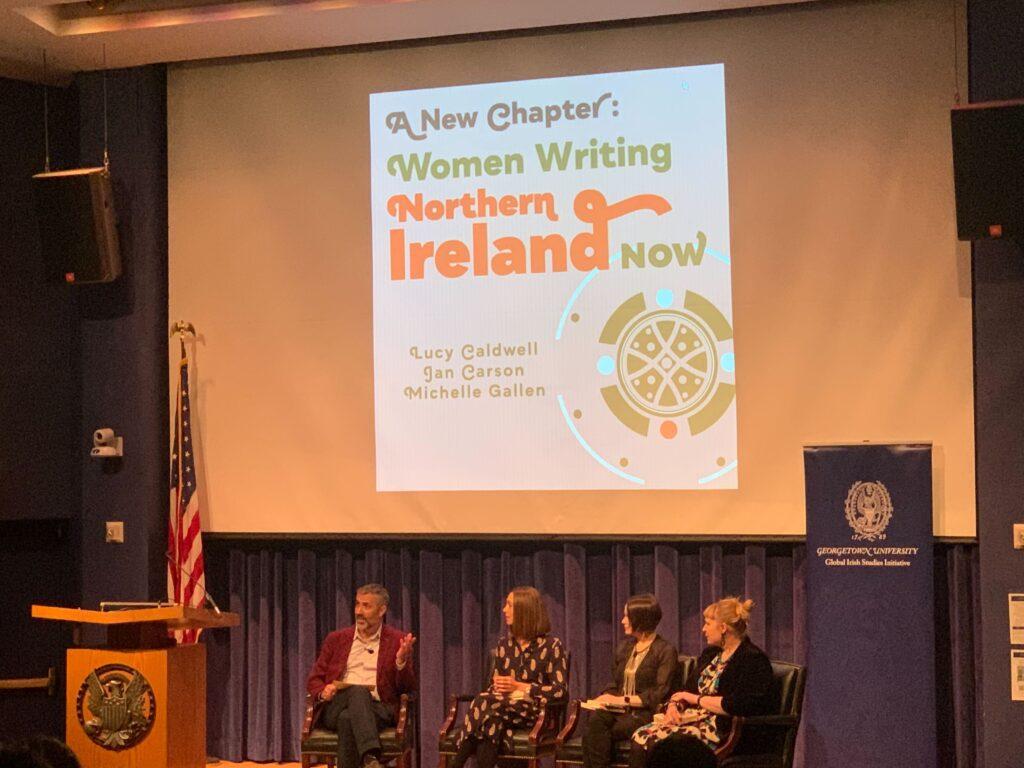A trio of female authors shared how their experiences living through conflict in Northern Ireland influenced their work during a Georgetown University event.
Global Irish Studies (GIS), the university’s initiative to foster conversations on Irish culture, hosted the event, “A New Chapter: Women Writing Northern Ireland Now,” on Nov. 29. The event featured the authors Lucy Caldwell, Jan Carson and Michelle Gallen, who have garnered critical acclaim for their near-dozen novels, plays and short-story collections. The three authors discussed how their experiences growing up during the Troubles — a period of conflict between Catholics and Protestants in Northern Ireland — influenced their creative work, their concept of their Northern Irish home and their experience as female writers.
At the event, Carson and Gallen read from their novels “The Raptures” and “Factory Girls,” respectively. Both novels share the experience of young Northern Irish people in the early nineties, before the end of The Troubles.
“You can’t turn on your telly without seeing dead bodies piled everywhere, blood pooling in the gutters. The people here are sick of death,” Carson read at the event. “This isn’t a third world country, this is Britain! Or this is Ireland, or both, or neither, or its own institution. Either way, it’s a civilized country. It’s been a whole two years since McDonald’s arrived.”
Both Carson and Gallen use humor extensively in their novels, despite the serious settings. Gallen said she uses humor to offset the emotional burden of her writing.
“It’s really funny, but it costs me to write this,” Gallen said at the event. “I just keep coming back to the same stuff. I do feel a certain weight of testimony.”
Caldwell read from her most recent novel “These Days,” which deals with an equally emotionally heavy topic, the Belfast Blitz, the World War II air raids on Belfast. She drew parallels between the Blitz and the 2020 COVID-19 era, a time that survivors would recall if asked in eighty years.
Caldwell said stoicism is an inextricable feature of her perception of Northern Ireland and her work. She said the expected societal response to a traumatic and uncertain event, whether war or pandemic, was identical.
“Stiff upper lip, good with crisis, cup of tea, carry on,” Caldwell said at the event.
Gallen shared her generation’s Northern Irish perspective through a story of how her husband, who is not from Northern Ireland, responded to a close colleague’s death.
“I really feel for my husband; this is the first time he’s known somebody to be shot, and it’s really hard for him,” Gallen said.
At the event, Cóilín Parsons, the event moderator and the director of GIS, asked the authors what it means to be a female writer in Northern Ireland.
Carson said her parents demonstrated to her that women’s soft power, a compassion-based approach to power, is a crucial aspect of Northern Irish culture.
“My father was very high up in the church, and he was a lovely man, but a weak man. My mum wore the trousers. She knew everything that was going on in the church through my dad and she told him how to vote and make decisions,” Carson said.
Carson added that she hopes authors and historians continue to uncover and share the roles women played in events like the 1998 Good Friday Agreement, a compromise facilitated by the British and Irish governments that officially ended much of the violence of the Troubles.
“In the last year, particularly, we suddenly started to acknowledge the women who were involved in the Good Friday agreement and the incredible things the women’s coalition did,” Carson said. “Suddenly they are getting acknowledged for the hard work they put in, but that’s just soft power.”
Gallen, meanwhile, focused on the intersectionality of gender, sexual identity and religion in the future of Northern Irish writers.
“Where are the stories of gay women in Northern Irish literature?” Gallen asked.
Towards the end of the event, the audience had the opportunity to ask Caldwell, Carson and Gallen questions. One person asked the authors how they thought their work could contribute to a brighter future in Northern Ireland.
Carson said the role of an artist is not the alter reality but is to stay close to the truth.
“Our first responsibility as artists is not to fix things or change things,” Carson said. “It’s just to be faithful to the art of creating art.”





















